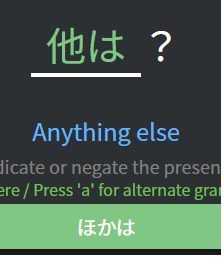other・another
any other・anything else
as well as・besides・in addition
1.他 + の + Noun
2.(この/あの/その +) 他 + に/にも/も/には/は、
3.Noun + の + 他 + に/にも/も/には/は、
4.Verb + 他 + に/にも/も/には/は、
5.(この/あの/その +) 他 + に/には/は、+ Negative
6.Noun + の + 他 + に/には/は、+ Negative
7.Verb + 他 + に/には/は、+ Negative**
1 他A means: other A
2-4 AほかB mean in addition to A/besides A, B
5-7 means nothing but/not~ other than/ not except for A. この/あの/その can be skipped if it is clear what speaker/writer is referring to. 2-7 can be used without following particle in formal writing
他に/にも/も/には/ all mean mostly the same thing. Though は has a stronger tendency to appear in negative sentences so try to not use it in affirmative ones, 他にも/他も doesn’t appear with negative sentences and この他 is used with nearby things.
 ほかにも cannot be used in negative sentences with the exception of questions 外 is another way to write ほか
ほかにも cannot be used in negative sentences with the exception of questions 外 is another way to write ほか


